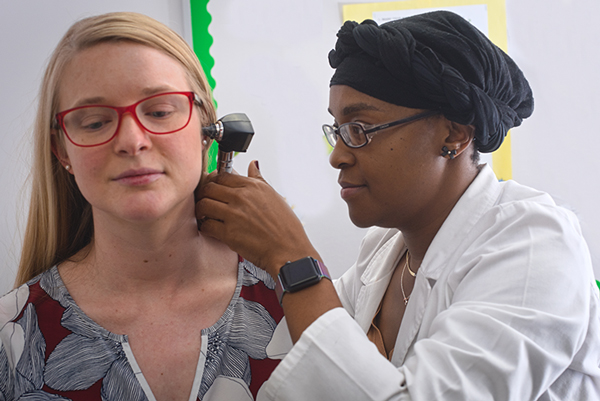Master of Science in Nursing
Program Overview

The Master of Science in Nursing program has several advanced practice specializations. The purposes of the program are to provide preparation for advanced nursing practice as a nurse practitioner and to provide a foundation for doctoral study. Post Master's certificate programs are available to prepare currently certified clinical nurse specialists and nurse practitioners who want to acquire specialization in any of the above areas of specialization.
Nursing education at the master's level builds upon baccalaureate nursing preparation. Program courses and content are organized and courses sequenced in a manner that facilitates the progression of student learning from that of a baccalaureate generalist to that of a specialist. The curriculum has two dimensions: core and specialization. Core courses are taken by all students and include evidence-based practice, health policy, and information management. All students also take pathophysiological concepts, advanced health assessment across the lifespan, and advanced pharmacology across the lifespan. Specialization courses are specific to advanced practice within a selected role.
Questions?
Susan Bradford
Phone: 330-972-7555
sb14@uakron.edu
Curricula and coursework
Follow the links below for detailed curriculum outlines and coursework descriptions for the MSN program and the advanced practice options, advanced practice specializations, and non-degree certificate programs.
Advanced practice options
- Adult Gerontology Health Nurse Practitioner Track
- Child and Adolescent Health Nurse Practitioner Primary Health Care Track
- Child and Adolescent Health Nurse Practitioner Acute Care Track
- Child and Adolescent Health Nurse Practitioner Primary/Acute Care Track
- Psychiatric Mental Health Nurse Practitioner Track
Admission requirements
- Baccalaureate degree in a nursing program accredited by the NLN Commission for Nursing Education Accreditation (CNEA), the Accreditation Commission for Education in Nursing (ACEN), or AACN’s Commission on Collegiate Nursing Education (CCNE). A baccalaureate degree in nursing from a foreign institution must be recognized by The University of Akron.
- 3.00 GPA on a 4.00 scale for BSN and all previous nursing degrees.
- Two letters of reference.
- 300-word essay describing professional goals.
- Current unrestricted State of Ohio Registered Nurse license.
- Applicants for the clinical tracks are required to have a minimum of 12 months registered nurse experience current within the last five years prior to entrance into the graduate program. The RN experience must be relevant to the area of interest.
- Interview prior to admission to the program.
Full Admission. Students admitted to the MSN Program in the School of Nursing are granted full admission with an undergraduate grade point average (GPA) of 3.00 on a 4.00 scale for BSN and all previous nursing degrees. No admission test is required for students who are granted full admission. Applicants with a GPA between 2.75 and 2.99 on a 4.00 point scale may be admitted to the MSN Program in the School of Nursing on a case by case basis.
Addressing the needs of the state and the region
The Masters Program in Nursing meets the needs of the state in several ways. The majority of graduates remain in the state to pursue their post-degree careers. These professionals advance the practice of nursing and health care to improve clinical and economic outcomes for patients/clients, nursing personnel and organization/network systems both independently and in collaboration with other health care professionals. Care provided by nurse practitioners and clinical nurse specialists has been associated with high patient satisfaction, cost effectiveness, and similar patient outcomes to care provided by physicians.
Placement objectives for graduates
Graduates of the Master's Program in Nursing are expected to fulfill positions in nursing and in other fields as advanced health care providers, educators, executives, and consultants. Advance nursing practice positions are found in a variety of primary, secondary, and tertiary care environments. The market for graduates with advanced practice roles is exceedingly strong. Many of these master's prepared nurses will go on to doctoral study and assume a role of nurse researcher in communities, hospitals, and faculty in higher education.
